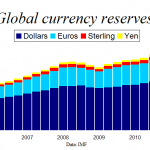The Swiss National Bank’s surprise decision Tuesday to try to prevent the Swiss franc from rising beyond SF1.20 to the Euro may well turn out to be a key miles-marker on the road to a global depression. The Swiss franc had become one of two leading refuges for investors seeking [continue reading . . . ]
The term “Lesser Depression” looks more appropriate by the hour. Harvard’s Kenneth Rogoff suggests another label, the Second Great Contraction (to distinguish it from the Great Depression). I’ve quoted him in Food for Thought. See his excellent essay on the op-ed of the Financial Times* on Aug. 9, 2011 The [continue reading . . . ]
On KUOW’s Weekday program July 6, I suggested Washington’s tourist industry tax itself to fund tourism promotion now that the state’s puny effort (that spawned such forgettable campaigns as “Say WA”) have dried up (here’s a link to a New York Times piece that appeared in the Seattle Times). I [continue reading . . . ]
The bad news is that the United States – indeed, much of the developed world – is in the midst of a “contained depression.” The private sector continues to de-leverage. Unemployment remains high. Pay for most is static or declining. Deflation remains a bigger threat than inflation. Depressions eventually end, [continue reading . . . ]
Oregon would have to increase taxes on each household by more than $2,000 each year for several years to fully fund the pension obligations of its public employees (those working for states, counties, cities, school districts, etc). By this measure, only in New Jersey and New York are the burdens [continue reading . . . ]
I drove to Portland from Seattle starting at mid-day Friday and so saw first hand the mess that is northbound I-5 in the Rose City at afternoon rush. Bumper-to-bumper traffic crawled between Portland’s Rose Quarter, across the Willamette River from downtown, and the Columbia River bridge (aka the Interstate Bridge) [continue reading . . . ]
Seattle is shaped like an hour glass, with salt water (Puget Sound) pushing in from the west, fresh water (Lake Washington) from the east. The jewel on Puget Sound has two principal north-south arteries through the narrowest part. One, an elevated double-decker built in the 1950s that walls the vibrant [continue reading . . . ]
Delivered with my New York Times on May 6, what is labeled the “Seattle Inaugural Issue” of China Daily, self-described as “the national English-language newspaper of the People’s Republic of China.” The paper runs 20 pages and is relatively unremarkable, with a couple of exceptions. First, there are almost no [continue reading . . . ]
I’ve said in this space before that I love newspapers. Of the four dailies I read, the one I would take to a desert island is, without question, the Financial Times. The pleasures of the salmon-colored broadsheet include such political insights as the following from Clive Crook, the newspaper’s chief [continue reading . . . ]
The U.S. is in such dire financial shape that it must raise taxes on the middle class as well as the rich AND curtail, via means-testing, giant entitlement programs, including Social Security and Medicare. That’s the Easter Sunday sermon from supply-side guru and former OMB director David A. Stockman via [continue reading . . . ]
Will the bond market tank when the Fed stops buying Treasury paper in a few weeks? As reported in today’s Wall Street Journal, two of the biggest players in the fixed-income market are at polar opposites. They both can’t be right. As I told a friend today, this is why [continue reading . . . ]

Is the dollar’s long run as the global reserve currency coming to an end? It is if the Chinese have anything to say about it. China owns the globe’s largest store of dollar-denominated assets outside the U.S. Understandably, it wants to diversify. The world needs an “international reserve currency that [continue reading . . . ]